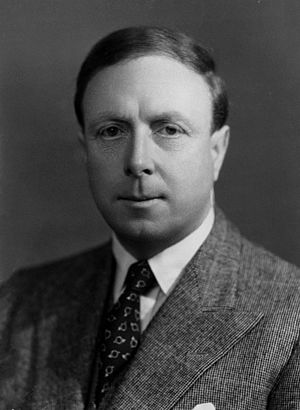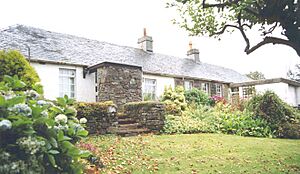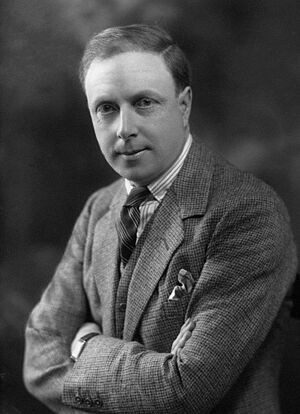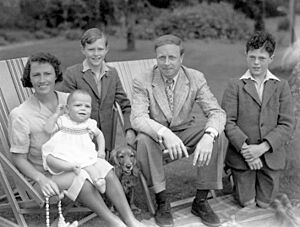A. J. Cronin facts for kids
Quick facts for kids
A. J. Cronin
|
|
|---|---|

Cronin in 1939
|
|
| Born | Archibald Joseph Cronin 19 July 1896 Cardross, Dunbartonshire, Scotland |
| Died | 6 January 1981 (aged 84) Montreux, Switzerland |
| Resting place | Cimetière de La Tour-de-Peilz, La Tour-de-Peilz, Vaud, Switzerland |
| Occupation | |
| Spouses |
Agnes Gibson
(m. 1921) |
| Children | 3, including Vincent and Patrick |
Archibald Joseph Cronin (born 19 July 1896 – died 6 January 1981), known as A. J. Cronin, was a Scottish physician and novelist. He wrote many popular books.
His most famous novel is The Citadel (1937). It tells the story of a Scottish doctor who works in a Welsh mining village. Later, the doctor moves to London. There, he sees problems and unfairness in the medical world. Cronin knew about these issues. He had worked as a medical inspector in mines and as a doctor in London.
The Citadel showed the problems in British medicine. It even helped inspire the creation of the National Health Service (NHS). This is a system that provides healthcare for everyone. Another popular book, The Stars Look Down, is also about miners. Many of his novels, like Hatter's Castle, The Keys of the Kingdom, and The Green Years, were made into movies. His story Country Doctor (1935) led to a long-running BBC radio and TV show called Dr. Finlay's Casebook.
Contents
Early Life and Education
Archibald Joseph Cronin was born in Cardross, Scotland. He was the only child of a Presbyterian mother and a Catholic father. His father, an insurance agent, died from tuberculosis when Cronin was seven. After this, he and his mother moved to Dumbarton to live with her parents. His mother became a public health inspector in Glasgow.
Cronin was a very smart student at Dumbarton Academy. He won many writing awards. He was also a great athlete and played association football (soccer). He loved golf and salmon fishing throughout his life.
Later, his family moved to Glasgow. Cronin went to St Aloysius' College. He played football for the school's top team. This experience even appeared in one of his later novels, The Minstrel Boy.
He decided to study medicine. In 1914, he won a scholarship to study at the University of Glasgow. He took a break from his studies in 1916–1917 to serve in the navy. He graduated in 1919 with top honors. Later that year, he worked as a ship's surgeon on a liner that went to India. Cronin continued his medical studies, earning more qualifications in public health and medicine. In 1925, he received his advanced medical degree from the University of Glasgow.
Medical Career
During World War I, Cronin worked as a surgeon in the Royal Navy Volunteer Reserve. After the war, he trained at several hospitals. He worked as a general doctor in Garelochhead, a village in Scotland, and in Tredegar, a mining town in South Wales.
In 1924, he became a Medical Inspector of Mines for Great Britain. He studied medical rules in coal mines. He also wrote reports about how breathing coal dust caused lung diseases. Cronin used his experiences and research from the mining industry in his novels. These included The Citadel, set in Wales, and The Stars Look Down, set in Northumberland.
Later, he moved to London. He worked in a famous medical area called Harley Street. Then, he opened his own busy medical practice in Notting Hill. He also worked as a medical officer for a large department store. He became very interested in ophthalmology, which is the study of eye health.
Writing Career Begins
In 1930, Cronin became ill with a stomach ulcer. Doctors told him to rest completely for six months. He went to a farm by Loch Fyne in Scotland. There, he finally had time to write a novel, something he had always wanted to do. He said he had "written nothing but prescriptions and scientific papers" before this.
He wrote his first novel, Hatter's Castle, in just three months. He sent it to only one publisher, Gollancz, and they accepted it right away. The book was a huge success. It started Cronin's career as a writer, and he never went back to practicing medicine.
Many of Cronin's books became bestsellers. They were translated into many languages. Some of his stories used his medical experiences. They often mixed real-life details, romance, and ideas about how society could be better. Cronin's books often explored how individuals deal with moral challenges in society. His main characters were often idealists who wanted fairness for ordinary people. For example, The Stars Look Down (1935) tells the story of problems in a mining community. It also follows an ambitious miner who becomes a Member of Parliament.
Cronin was a very fast writer. He aimed to write about 5,000 words a day. He carefully planned out his stories beforehand. He was known to be tough in business. But in his private life, he had a good sense of humor, according to one of his editors.
During World War II, Cronin also worked for the British Ministry of Information. He wrote articles and made radio broadcasts to other countries.
Impact of The Citadel
The Citadel (1937) was a very important novel. It told the story of a doctor in a mining company. He tried to balance good medical science with his duties to the community. The book helped lead to the creation of the National Health Service (NHS) in the United Kingdom. It showed the unfairness and problems in medical care at the time.
In the novel, Cronin suggested a free public health service. This would help stop doctors who were more interested in making money than helping patients. Cronin and a politician named Aneurin Bevan had both worked at the Tredegar Cottage Hospital in Wales. This hospital was one of the ideas behind the NHS.
Cronin's book made some doctors angry. One group even tried to get The Citadel banned. But the novel became Gollancz's highest-selling book ever. It taught the public about problems in the medical system, which eventually led to big changes. Cronin's ideas were key to creating the NHS. Some historians even say his popular novels helped the Labour Party win a big election in 1945.
However, not everyone liked the book. Some doctors felt it didn't praise hard-working doctors enough. But most people saw it as a timely novel. The press and publisher tried to create excitement around the book. They sometimes forgot it was a fictional story, not a scientific report.
In the United States, The Citadel won the National Book Award for Favorite Fiction in 1937. A 1939 poll found that The Citadel was voted the most interesting book readers had ever read.
Family Life
Cronin met his future wife, Agnes Mary Gibson (May), at university. She was also a medical student. They married on August 31, 1921. As a doctor, Mary worked with her husband for a short time. She also helped him with his practice in London. When he became a writer, she would read and check his manuscripts.
Their first son, Vincent, was born in Wales in 1924. Their second son, Patrick, was born in London in 1926. Their youngest son, Andrew, was born in London in 1937.
Because his stories were being made into Hollywood movies, Cronin and his family moved to the United States in 1939. They lived in several places, including Bel Air, California, and New Canaan, Connecticut. Cronin also often traveled to summer homes in Bermuda and France.
Later Years
Eventually, Cronin returned to Europe. He lived in Lucerne and Montreux, Switzerland, for the last 25 years of his life. He kept writing even into his eighties. He was friends with famous people like Laurence Olivier, Charlie Chaplin, and Audrey Hepburn. He was even a godfather to Audrey Hepburn's first son.
Even though he lived abroad, Cronin always loved the area where he grew up. In 1972, he wrote to a local teacher: "My heart belongs to Dumbarton." He even followed the Dumbarton football team with great passion. A letter from him, written in 1972, hangs in the club's stadium. In it, he congratulates the team on returning to the top division after 50 years. He remembered being "lifted over" the turnstiles as a child to watch games.
A. J. Cronin died on January 6, 1981, in Montreux, Switzerland. He is buried in La Tour-de-Peilz. Many of his writings, including his books, drafts, letters, and school work, are kept at the National Library of Scotland and the Harry Ransom Center at the University of Texas.
His wife, Agnes, died on June 10, 1981. Her ashes were buried next to him.
Honours
- National Book Award (U.S.), Favorite Novel of 1937, for The Citadel
- Received honorary degrees (Litt.D.) from Bowdoin College (1942) and Lafayette College (1954).
- On March 27, 2015, a blue plaque was put up by the RCGP at 152 Westbourne Grove in Notting Hill. This plaque honors his work.
Film Adaptations
Many of A. J. Cronin's books and stories were made into films:
- 1934 – Once to Every Woman (from a short story)
- 1934 – Grand Canary
- 1938 – The Citadel
- 1940 – Vigil in the Night
- 1940 – The Stars Look Down
- 1941 – Shining Victory (from a play)
- 1942 – Hatter's Castle
- 1944 – The Keys of the Kingdom
- 1946 – The Green Years
- 1953 – Ich suche Dich ("I Seek You" – from a play)
- 1955 – Sabar Uparey (from the novel Beyond This Place)
- 1957 – The Spanish Gardener
- 1958 – Kala Pani ("Black Water" – from the novel Beyond This Place)
- 1959 – Web of Evidence (from the novel Beyond This Place)
- 1967 – Poola Rangadu (from the novel Beyond This Place)
- 1971 – Tere Mere Sapne ("Our Dreams" – from the novel The Citadel)
- 1972 – Jiban Saikate (from the novel The Citadel)
- 1975 – Mausam ("Seasons", from the novel The Judas Tree)
- 1982 – Madhura Swapnam (from the novel The Citadel)
Television Shows
Several TV shows were based on Cronin's works:
- 1955 – Escape From Fear (CBS)
- 1957 – Beyond This Place (CBS)
- 1958 – Nicholas (TV Tupi)
- 1960 – The Citadel (ABC)
- 1960 – The Citadel (British miniseries)
- 1962–1971 – Dr Finlay's Casebook (BBC)
- 1962 and 1963 – The Ordeal of Dr Shannon (NBC & ITV)
- 1963–1965 – Memorandum van een dokter
- 1964 – La Cittadella (RAI)
- 1964 – Novi asistent
- 1967 – O Jardineiro Espanhol (TV Tupi)
- 1971 – E le stelle stanno a guardare (RAI)
- 1975 – The Stars Look Down (Granada)
- 1976 – Slečna Meg a talíř Ming (Československá Televise)
- 1977 – Les Années d'illusion (TF1)
- 1983 – The Citadel (BBC and PBS)
- 1993–1996 – Doctor Finlay (ITV and PBS)
- 2003 – La Cittadella (Titanus)
Radio Shows
Cronin's stories were also adapted for radio:
- 1940 – The Citadel (The Campbell Playhouse CBS)
- 1970–1978 – Dr Finlay's Casebook (BBC Radio 4)
- 2001–2002 – Adventures of a Black Bag (BBC Radio 4)
- 2007–2009 – Doctor Finlay: The Further Adventures of a Black Bag (BBC Radio 7)
See Also
 In Spanish: A. J. Cronin para niños
In Spanish: A. J. Cronin para niños
- Physician writer
 | Shirley Ann Jackson |
 | Garett Morgan |
 | J. Ernest Wilkins Jr. |
 | Elijah McCoy |




